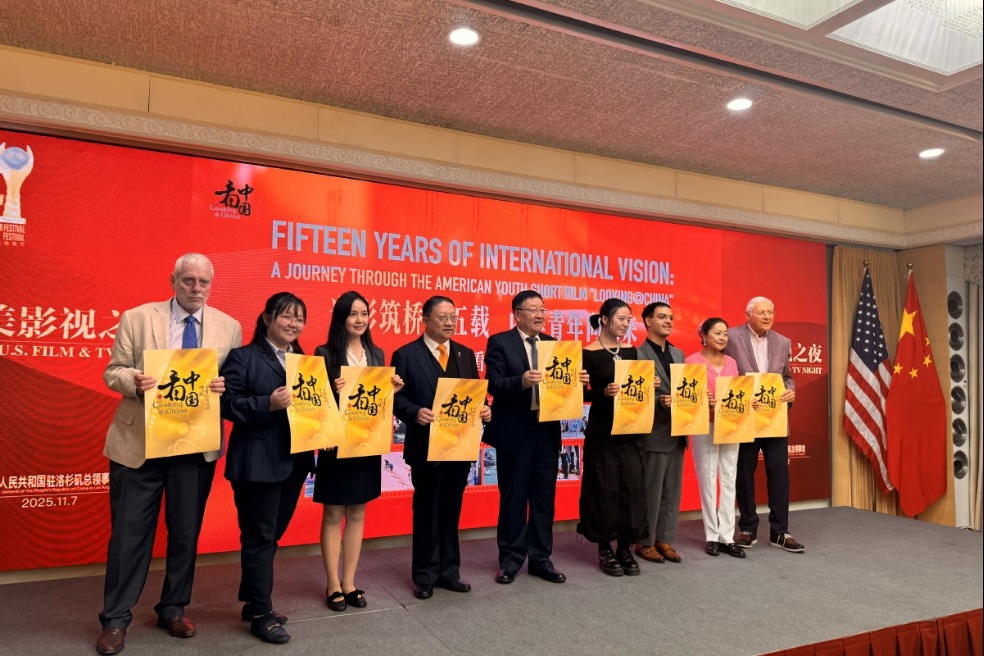Working to address China misperceptions
By ZHAO HUANXIN in Washington | chinadaily.com.cn | Updated: 2021-09-02 10:50

After he retired from national political life, former US president George H.W. Bush worked to advance the dialogue between China and the United States by hosting conferences to promote what he called the "most consequential bilateral relationship" in the world.
As he progressed in age, the 41st president, a Republican, asked his son, Neil Bush, to chair the meetings on his behalf, an arrangement that ultimately ushered in the founding of the George H.W. Bush Foundation for US-China Relations in May 2017, about a year and a half before its namesake died.
"My dad believed that countries and families and friends need to stay in touch with one another, in order to better understand one another, in order to put yourself in the other guy's shoes" so as to address conflicts "in a mature way" when they arise, noted Bush, founder and chairman of the foundation.
"We got away from that for five years or so," Bush said Monday at a webinar where he recalled the start of the organization and reflected on the 50 years of US-China relations and his father's legacy.
That's why the Bush China organization, and many American "moderates", are committed to getting the relations back on course, and in that course, dialogue and communication is crucial, Bush and the foundation's president and CEO David J. Firestein said at the discussion, hosted by the Center for China and Globalization, based in Beijing.
"We've come into this kind of crazy time where China's rise is all of a sudden being recognized by politicians as a threat to the United States," and China has become an "easy target", Bush said.
Once the US can get over the hurdle that China doesn't represent a threat to its national security, economy or way of life, then "through dialogue, we'll establish better understanding and more cooperation", he added.
The US has values to stand on, but they should be expressed in a way that is "respectful and not finger-pointing, or in a derogatory way", he said.
"The ultimate goal should be to come together as often as possible in as many different ways as possible, and to resolve challenges, you know, respectfully and maturely," Bush said.
Firestein said that while for the most part of the last half century — until the Trump administration, there had been a bipartisan consensus that it was good for America to engage China, there's now "unfortunately" a new consensus in Washington that pictures China as its "enemy".
"The Bush China foundation rejects that," Firestein said.
The career US diplomat and authors of many books on China said the belief that drove the "consensus" is actually rooted in two "erroneous" assessments of China's intentions.
The first one is that they believe China seeks to displace the United States and supplant it as the world's only superpower.
"I think that is an absolutely fundamental misreading of what China actually wants to do," Firestein said.
Secondly, those people believe that China seeks to replicate its system all across the world.
"I think those are incorrect understandings of what China actually seeks to do," he said.
"When the fundamental premises of US policy toward China are wrong, the resulting policies that purport to address those concerns are going to veer off course, and I think that's what we've seen over the last several years," Firestein said.
Chinese Ambassador to the US Qin Gang also noted that some people in the US believe that China is betting against America, and China's goal is to challenge and displace America.
"This is a serious misjudgment of China's strategic intention," Qin said at an online reception by the National Committee on US-China Relations Board of Directors on Tuesday.
China's plans and policies are tailored for the purpose of meeting the people's aspirations for a better life. It has never considered surpassing the US as its goal, or having the ambition to challenge and displace America, or to seek global hegemony, Qin said.
Firestein said that a number of differences between the two largest economies are "simply irreconcilable", but still they can have a businesslike and a functional, constructive, results-oriented, mutually beneficial and politically sustainable relationship.
"We all aspire to do that, and rather than say, look, because we disagree on all these different profound issues, let's take our ball and go home, we advocate the opposite. We advocate for the idea that this is all the more reason that we need to come together with a problem-solving mindset," Firestein said.
Both Bush and Firestein proposed the US and China cooperate on climate change, pandemic prevention, the Afghanistan situation and in the energy sector.
The two countries should move back in a direction "where we're actually speaking to each other in a businesslike way and focusing on solving problems", Firestein said.
He also said the Bush China organization is a pro-business and pro-globalization organization.
"Because we understand economics, and we understand that trade is good for America, it's good for the world, and we want to move back in that direction," he said.
























